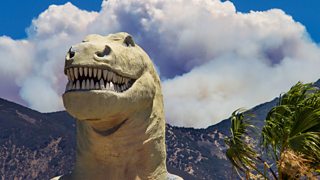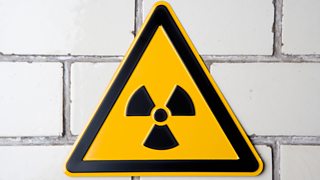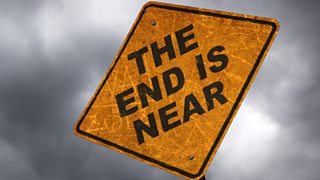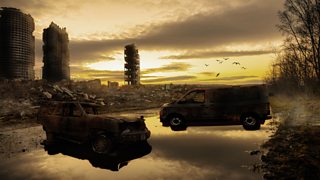Will humans survive the century?
There are many potential dangers to the human race: climate change, nuclear war, a pandemic, or planet Earth being hit by a giant asteroid to name just a few. But just how precarious is our civilisation?
In Will humans survive the century? David Edmonds meets with the experts whose working lives are devoted to answering just this question and investigating how to mitigate the giant risks we face.
What is an existential risk?
“An existential risk is a threat to humanity or our descendants that would essentially end the story,” says Anders Sandberg, a researcher from Oxford’s Future of Humanity Institute.
Up until the middle of the 20th century we thought we lived in a pretty safe place, but that’s not the case any longer. Alarmingly, the existential risks that threaten to bring about the destruction of mankind are many and varied.
Asteroids hitting earth
Before the 1980s we didn’t think the earth was subject to large, global scale catastrophes as a result of rocks falling from the sky. But in 1980 a father and son scientist duo called Luis and Walter Alvarez published their hypothesis that dinosaurs were killed off by an asteroid hitting the planet.
The Alvarez hypothesis has more recently been endorsed by an international panel of scientists, in part following the discovery of a giant crater in the Yucatán Peninsula in Mexico.
However, within the hardheaded existential risk community, the chance of the world ending as a result of an unfortunate asteroid collision is considered remote – compared to the risks we’re creating ourselves…
Overpopulation, resource depletion and climate change
How sexy were dinosaurs?

Were some appendages on dinosaurs actually there for sexual selection?
Most of us recognise the risk that climate change poses but Karin Kuhlemann, a researcher at University College London, is focusing on population size.
It’s something that rarely makes the headlines - along with the depletion of natural resources it’s something that makes us feel bad, so we prefer not to think about it.
But, like many things that might send humans to an early collective grave, climate change and overpopulation are interconnected, says Karin, and they’re our fault.
“Climate change is an aspect of overpopulation, as is resource depletion and they feed into one another. Resources are running out and then we use more oil to make up for the fact that we’re running out of resources, worsening climate change,” says the researcher.
Until the population stops increasing, halting climate change could be an impossible task.
Global population growth: The pessimistic view

One view on why even the current population may be unsustainable.
The destruction of biodiversity
We’ve been living as though eliminating wildlife is just “a pity”, but some research suggests that there won’t be fish in the sea, to a level sufficient to support commercial agricultural fishing, by the middle of the century.

There won’t be fish and chips anymore and there won’t be fish to buy in supermarkets because we will have cleaned up.
Insects too have been quietly disappearing and birds are vanishing too because they eat the insects.
We don’t know what the effects of depleting biodiversity will be, says Karin, but there is certainly a poorly understood sense that it is going to work out badly for us.
Pandemics
Lalitha Sundaram, at the Centre for Existential Risk in Cambridge, assesses biological risk. Reflecting on the Spanish flu pandemic of 1918, she says the estimates are that around 50% of the population were at one time infected and between 50 and 100 million people died.
Until the population stops increasing, halting climate change could be an impossible task.
The pandemic occurred when there was huge migration – people were being shipped back from the war and living in very close quarters. So, although we’re now better at developing vaccines, globalisation brings danger.
During the Spanish flu people travelled by train and boat but in this era of air travel disease can spread even faster than ever, with potentially devastating consequences.
The threat of individuals
Most of the human-created existential risks are unintentional, but as science and technology advance we’re focusing the possibility of rogue agents launching catastrophic attacks, for example creating a virus in a lab using synthetic biology.

If there was a doomsday button that would destroy us all, there are a potentially worrying number of people who would choose to push it, says researcher Phil Torres from the Future of Life Institute.
These ‘button pushers’ could include religious inspired extremists who believe they are mandated by god to destroy the world in order to save it, like those in the Japanese doomsday cult Aum Shinrikyo.
However, we are also at risk from what Phil describes as ‘idiosyncratic actors’ – people who are motivated to bring about human extinction for their own personal reasons, like rampage shooters. These individuals may have expressed omnicidal desires publically or in private diaries.
How many button pushers are really out there? Some estimates suggest 300 million sociopaths or psychopaths exist in the world today – many of whom could pose a threat.
Nuclear war
A nuclear war probably wouldn’t kill us all, but the after effects might. Seth Baum, from the Global Catastrophic Risk Institute, explains how the burning of cities from a nuclear explosion can send dust up past the clouds and in to the stratosphere. This dust would potentially stay there for decades, blocking sunlight.
Why anger goes viral

The social role of anger and why so many groups have begun to rely on it to get their way.
Human extinction from nuclear war would be a combination of the initial devastation caused, economic disruption and then finally the global environmental effects.
Artificial intelligence
AI risks come in various forms: the risk that autonomous algorithms might accidentally cause a global stock market collapse leading to economic implosion or the idea that we might lose complete control to machines.
One scenario that experts are worried about is the creation of ‘deep fake’ videos where footage of a prominent person is manipulated so they appear to be doing or saying what the creator wants them too.
A malicious agent could fake a video where one world leader threatens another, thereby ramping up tensions between two nuclear powers. This technology exists already, and is getting harder and harder to detect.
How would a PM push the nuclear button?

The procedure a prime minister would follow to authorise the firing of nuclear missiles.
How do we reduce these existential risks?
It all depends on the risk in question.

Anders Sandberg is working on how future machines will stay under human control. Other experts are planning how to respond if there is a disaster like a pandemic.
And some researchers are looking into how to geo-engineer the climate by adding dust to the stratosphere, or how to survive a nuclear winter on a heavily mushroom-based diet.
For Karin Kuhlemann, the single most important fix for many existential risks is to reverse population growth.
She believes we need to change social norms surrounding family size, ditching the attitude that we are all entitled to have children and consume as much as we want to. In this way we can all play a part in preventing global catastrophe.
Humans aren’t very good at taking a long-term perspective, and our institutions aren’t geared to the interests of future generations, but – if the 21st century is not to be our last – we need to take existential risk more seriously.
The future is not set in stone. There are things we can do to help and the time to act is now.
More from Radio 4
-
![]()
Analysis: Will humans survive the century?
How can we successfully reduce threats from pandemics and natural disasters, climate change and nuclear war?
-
![]()
Fun ways to prepare for the end of the world
What can you do to ready yourself for the inevitable global calamity and ensuing chaos?
-
![]()
How having a purpose can help us
How having a purpose brings a clearer pathway through the dark and difficult winter days.
-
![]()
When is it good to worry?
Should we try to stop worrying, or does anxiety serve a purpose?





